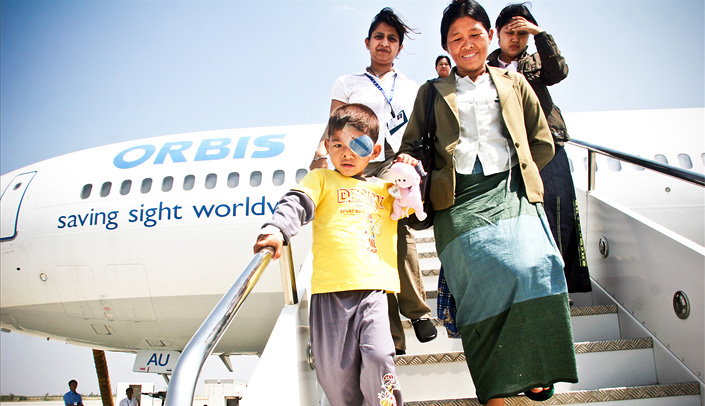By July of 2015, one lucky ophthalmologist will embark on a unique two-year fellowship that will take him or her around the world.
The fellowship, designed by Orbis International and the Prevention of Global Blindness Division of the Truhlsen Eye Institute (TEI) at UNMC, serves as the most comprehensive program available to any ophthalmologist in the world who has a significant interest in global blindness prevention.
Orbis is a nonprofit organization that works in developing countries to prevent and treat avoidable blindness using a converted DC-10 airplane that is the world’s largest flying eye hospital. This is the first time Orbis has partnered with an academic medical center on a fellowship.
“This fellowship features a strong emphasis on public health and program development, which puts it in a category of its own,” said Michael Feilmeier, M.D., chief of the Prevention of Global Blindness Division and assistant professor of ophthalmology at the TEI.
“The fellow will split their time working at the same international partner institutions we already serve, whereby amassing the same skills and relationships offered by the one-year program, while also taking on the critical role of developing a country specific program for Orbis’ flying eye hospital.”
Quan Dong Nguyen, M.D., the McGaw Memorial Endowed Professor, chair of the department of ophthalmology and inaugural director of the TEI, said the institute already has garnered distinction by being one of only three eye centers in the United States to offer a formal fellowship in the prevention of global blindness.
“By partnering with Orbis International, TEI extends its lead in training ophthalmologists to devote their careers to serving patients who are truly in need of eye care,” Dr. Nguyen said.
The Prevention of Global Blindness Division is accepting applications for the 2015 fellowship through Oct. 25. The fellowship is primarily spent abroad and is open to any applicant who has completed one or both of the following ophthalmology residencies: the Educational Commission for Foreign Medical Graduates; or the U.S. Accreditation Council for Graduate Medical Education.
The fellowship begins at TEI and UNMC’s College of Public Health, where a certificate in public health must be completed within the twoyear time frame, Dr. Nguyen said.
Shortly after enrolling in public health courses, the fellow will begin training aboard the flying eye hospital. Subsequently, the fellow will be assigned a country in which Orbis plans to conduct a program.
“It will be the responsibility of the fellow to conduct a regional needs analysis, communicate with local eye care providers and ultimately plan the program that will be conducted by Orbis when the flying eye hospital arrives,” Dr. Feilmeier said.
The TEI/Orbis program is the second fellowship offered through the Prevention of Global Blindness Division. A one-year fellowship allows fellows to spend time working at partner institutions in Nepal, Haiti, Ethiopia and Ghana, among others, where the focus is learning about different eye care delivery systems while simultaneously enhancing and mastering a unique surgical experience.
“The final month of the one-year fellowship is spent working on community outreach programs delivering eye care to local Native Americans in the United States,” Dr. Feilmeier said.
Since the 1970s, Orbis has trained 325,000 medical professionals and impacted more than 23 million lives in 92 countries.
